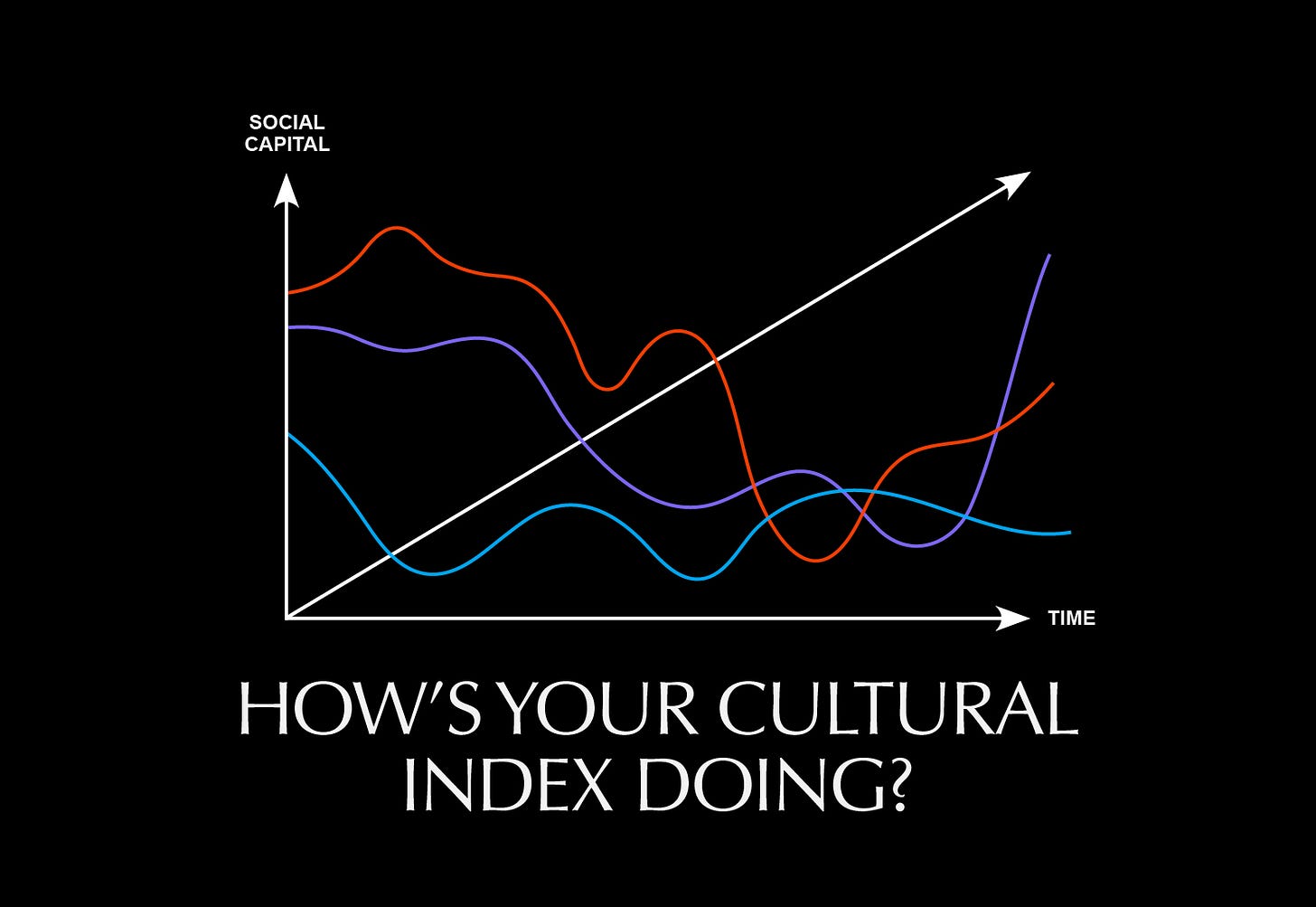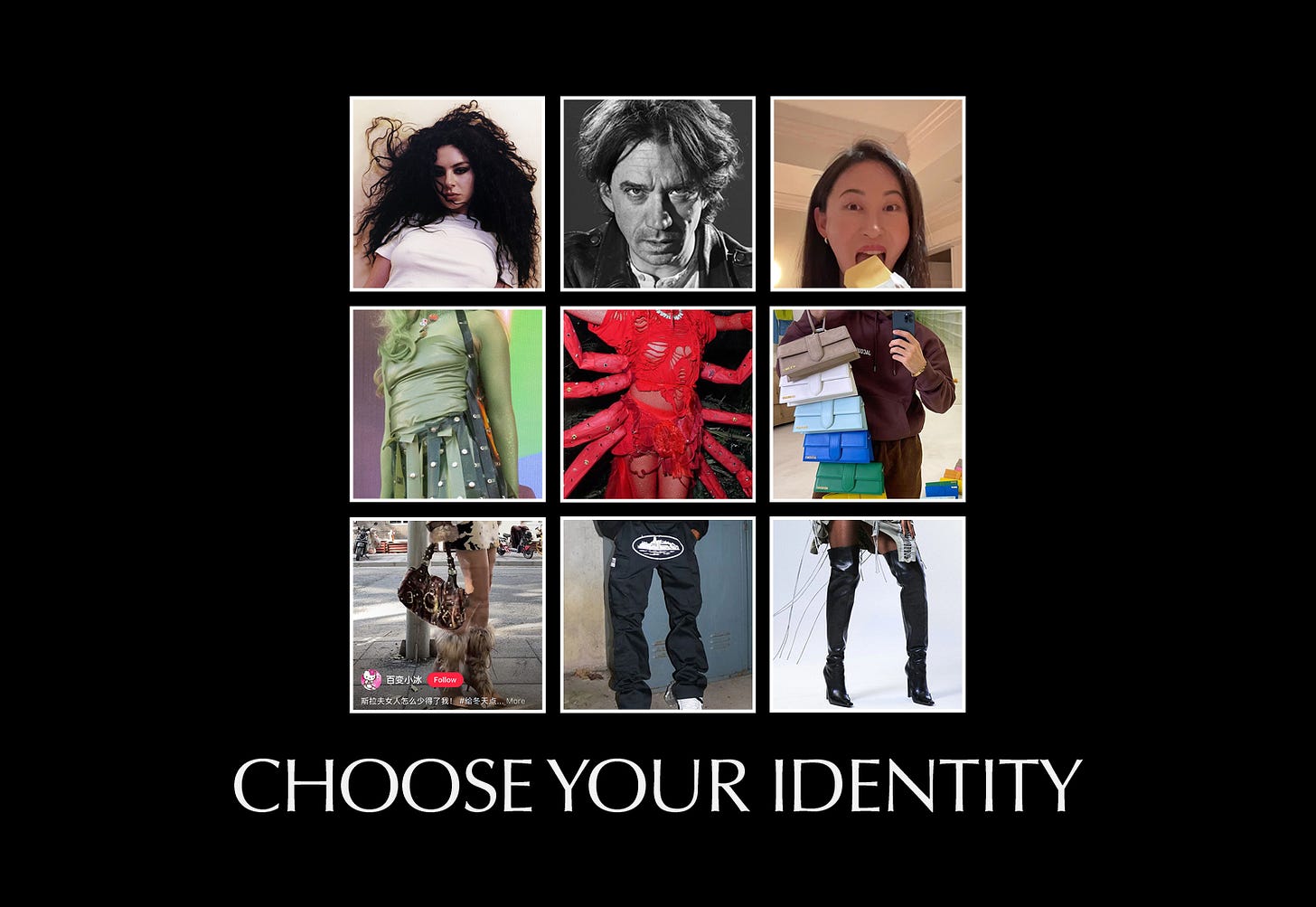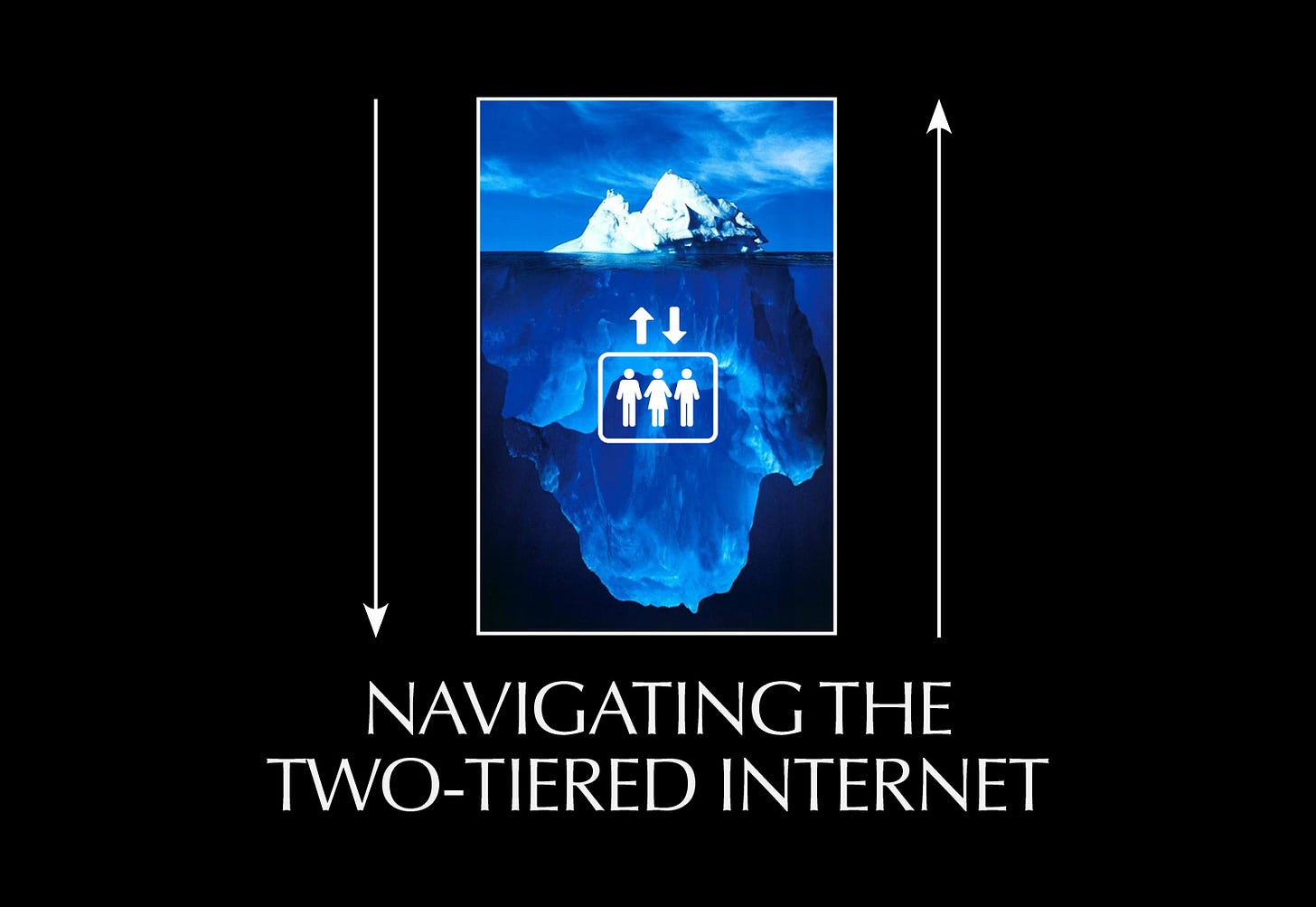Now that good is over, big tent ideas are getting replaced by weird new niche ideologies that travel from the fringes to the center stage, such as The New Right taking over the White House. Having a fixed position, a moral stance, and set of values is neither good nor bad, it just ties you to a certain community.
In order to survive a volatile world, the winners of today’s landscape are placing their cultural capital on multiple ideologies, identities, and platforms akin to index hedge funds.
It used to be that culture, and especially subculture, were highly committed and singular.
Being a punk meant committing to certain values (Left politics, DIY etc.), listening to certain music (Black Flag, Crass etc.), and having a certain aesthetic (even if manufactured by Vivienne Westwood). Subculture was defined just as much by what to do (being punk) as what not to do (being a normie) and straying too far from the community norms (like selling out) could have serious reputational liability. The same went for hippies, and goths, ravers, and whatever other micro genre. Codes of honor were real (if maybe a bit loose).
Rather than committing to specific moral stances or subcultural camps, people are spreading their cultural capital across multiple spaces, communities, and belief systems - creating hedges against an increasingly volatile landscape which is itself a product of how easy online culture makes it to exit or remain noncommittal in the first place.
Like an index fund that minimizes risk, we are increasingly spreading our cultural capital in a diversified portfolio and indexing to the platforms.
This isn't mere risk management - it's an adaptation to a fragmented, online (and offline) culture where everything is flattened by algorithms, devoid of context, and cultivated as yet another consumer trend to be capitalized on. The democratization of media and culture means that the gatekeepers are gone and commitments are missing. Without those bulwarks of honor or idealism, the shared consensus around subculture falls apart. Instead, they become roles you play as you shift positions in your identity portfolio to maximize attention, clout, or belonging at a given point in time while avoiding the downward trend of subcultures losing clout over time.
That’s why the ability to maintain multiple, often contradictory cultural positions has become essential for thriving in an environment where yesterday's moral stance is tomorrow's liability.
So is this the new normal or could it be a provisional attitude as the new networked, multipolar world order emerges and people don’t really want to bet on any horse until they know a few things are settled?
We argue the latter, which could account for the myriad of mixed up identities and ideologies we see today:
1. In popular culture: Code switches emerging from carnivore/butter chugging trad fems like @steakandbuttergal, mixing a lot of traditionally dainty images of femininity with the carnivore bro culture of the manosphere.
2. In politics: New Right evangelists like think tank American Compass or Curtis Yarvin (who went full circle from cringe fringe philosopher to New York Times profile) have jettisoned people like US Vice President JD Vance into the spotlight. What’s curious is their mix of Right wing coded stances on identity and nationalism matched with pro-social messages and policies, outflanking Left positions on social programs and unions—then stir that around with a vision of a start-up CEO as monarch and we end up with one seriously “unique” set of politics.
3. In technology: How the AI wars are playing out where Left vs. Right, luddite vs. accelerationist, pro-worker vs. full automation, West vs. the rest (China), censorship vs. privacy, IP vs. “information is free” positions break apart into a dizzying amount of admixtures. As AI is integrated into our lives, theory meets world and the effects are way more difficult to keep a consistent position on so people are throwing together ideas to see how they coalesce.
And that’s just to name a few. All are concurrent examples of emergent patterns, proof that strange new cultural identities are forming weird, mixed up, and fluid.
Clearly this is a reaction to the cult of authenticity and self branding that became ubiquitous for people over the last years of social media who are trying to leverage who they are for social, political, or professional gain. Being perceived as having a fixed identity was the cultural vehicle which helped viewers and algorithms locate you in a map of distinguishable values, aesthetics, and politics that aligned with what you were trying to communicate (even if you didn’t sincerely believe them).
But over time people have found out these were just personas or cash grabs that are not particularly trustworthy. See the “unmasking” fiasco just before the temporary US TikTok ban when creators were admitting to lying about what they showcased on their accounts because they felt like the economic incentives were about to vanish. Whoops!
Winners and losers of this new online space are determined by who can remain flexible (even cynically) or who are stuck, locked-in, trying to manage the commentariat and maintain the platform's network effects that keep you publicly relevant.
Meanwhile, the indexmaxxers keep a sanitized amorphous identity on clearnet while fleeing into the “dark forest” corners of the internet: a place where private group chats, invite-only forums, and micro communities can offer the safety of discretion and the comfort of the echo-chamber in an overexposed world.
It’s not an either/or story; it's that indexmaxxers are in reality doing both. Hence the IG post listing your Bluesky address becoming part of your IG brand while you still use the DMs because, well, you have to. This "Dark Forest" migration isn't just about avoiding harassment or cancellation - it's about maintaining optionality in an uncertain cultural landscape.
A new two-tiered system emerges: a public sphere of carefully curated personas, and a private layer of actual cultural evolution and exchange.
It’s a form of cultural arbitrage, where individuals maintain different, sometimes contradictory positions across various private spaces while presenting a sanitized version on main. This isn't necessarily deceptive. It's adaptive ambiguity in response to an increasingly volatile cultural environment where we wait for something important to emerge that we can latch onto for a while.
The age of cultural portfolio theory isn't necessarily dystopian—it's simply the next evolution in how humans navigate increasingly complex social and technological systems. The ability to move fluidly between communities, maintain multiple positions, and understand the subtle indexing of sincerity and irony across different spaces is becoming a core competency of digital life.
The challenge ahead isn't about returning to some imagined era of cultural authenticity, but rather developing new frameworks for understanding this more complex cultural landscape. Success in this environment requires not just maintaining multiple positions, but understanding how to navigate between them effectively.
If Poe’s law had it that sincerity and irony can easily become indistinguishable online, its new iteration might entail survival through what appears as deception in an environment where meaning itself has become unstable. So it makes more sense to just accept that there is no difference between sincerity and irony. Take it at face value and know that each are staking out the terrain of cultural debates or ideas. Whoever your “team” is or whoever wins the debate gets to decide what the real meaning is.
In the New World Order where power, ideologies, and tech infrastructure collide, cultural capital is about having the breadth of understanding to contextualize and the ability to navigate between different cultural contexts rather than the depth of knowledge or being committed to particular ideas.
The cultural portfolio isn't just a hedge against uncertainty—it's becoming the primary mode of cultural participation.
—-
This is edition 2 of New World Order: a 6-part newsletter series about how politics, power and ideology merge with digital infrastructure. Subscribe to access our next briefing, due in March 2025.









